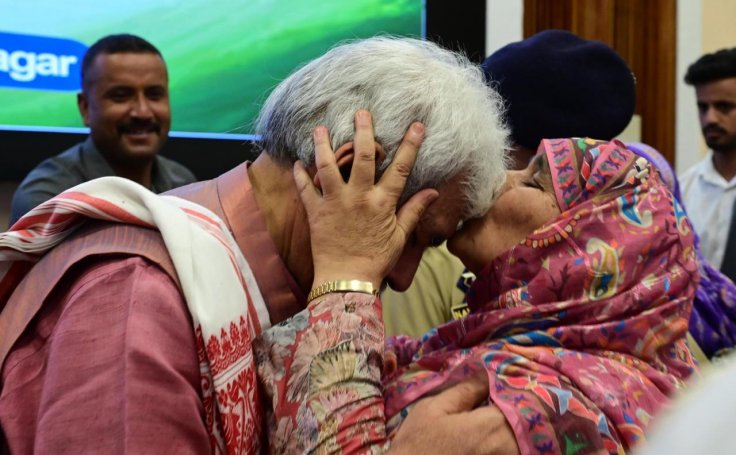How India’s New Push Offers Hope to Terror victims
Kousar Jan once dreamed of being a doctor. That ended one brutal night in 2002 when terrorists in her Pahalgam village murdered her father, leaving his bullet-ridden body separated from his head by a stream. Her family, branded “informers,” hid under a tin shed, abandoned even by relatives. “We were shattered and homeless,” Kousar, now 33, recalls.
For 23 years, her family’s plea for justice or basic support went unheard—until last month, when she finally received a government job offer. “LG saab (Mr. L.G) listened to my ordeal like a father,” she says, her voice trembling with disbelief.
Kousar is among hundreds of terror victims’ families across Jammu and Kashmir (J&K) now receiving unprecedented attention from the region’s administration.
In a sweeping initiative, J&K Lieutenant Governor Manoj Sinha is confronting a legacy of systemic neglect spanning decades—offering government jobs, reopening investigations, and restoring properties seized by militants or their sympathizers.
Office of J&K LG
The Scale of Suffering
Decades of Violence: Since the 1990s, thousands of innocent civilians have been killed by Pakistan-backed terrorist groups like Lashkar-e-Taiba (LeT) and Jaish-e-Mohammed (JeM).
Families faced social isolation, economic ruin, and bureaucratic hurdles. FIRs (police reports) were often never filed. Jobs due under compassionate rules were denied due to technicalities like age limits or missed deadlines.
As Lt. Gov. Sinha starkly put it, “Pakistan supporters and sympathisers got government jobs… while victims suffered silently”. Terrorists or their overground workers were sometimes even absorbed into local administrations.
The Government’s Response: Jobs, Justice, and Rehabilitation
In a significant policy shift, the J&K administration under Sinha has launched a multi-pronged approach focused on “justice and jobs”:
1. Compassionate Appointments
370+ Jobs Offered: 40 families received appointment letters in Baramulla (July 13), 80 in Jammu (July 28), and 250 more are being handed out today (August 5) in Srinagar—the 6th anniversary of J&K’s constitutional reorganization.
Thousands more applications are being processed via dedicated helplines and portals, with over 2,000 complaints received, some dating to the 1990s.
2. Financial & Livelihood Support
Each family receives access to ₹20 lakh (approx. $24,000 USD) under the Pradhan Mantri Mudra Yojana for self-employment or startups.
3. Pursuing Legal Justice
Reopening Frozen Cases: District officials and police are mandated to trace old killings, file missing FIRs, and investigate—regardless of elapsed time. “No one will be spared,” vows Sinha.
Property Restoration: Lands and homes forcibly taken by militants or encroached upon are being returned to victim families .
Voices from the Shadows
Gul Hassan Shah, 96, Pulwama: Blinded by two decades of weeping for his son Syed, dragged away by gunmen in 2003. “I cried myself to blindness… I want to know why he was killed”.

Office of J&K LG
Sheetal Sen, Kishtwar: Her brother Hansraj was killed in 2001. After years of bureaucratic rejection, she finally received a health department job: “LG Sinha acknowledged our hardship” .
Sara Begum, Tral: Lost her son (a carpenter) in 2002. Her husband died after being tortured by militants seeking to stop him from filing a police report. Her grandson now hopes for a job.
Junaid Malla from Anantnag said his father, an SPO, died fighting terrorists when he was 3. “I told my mother his sacrifice was wasted. Today I proudly say I am a martyr’s son. LG Manoj Sinha lit the dark homes of martyrs again.”
Challenges and the Road Ahead
While promising, the initiative faces hurdles:
Decades of Decay: Evidence is lost, witnesses dead, records incomplete. Rebuilding cases requires immense forensic and investigative effort.
Systemic Distrust: Past failures bred deep cynicism. R.R. Swain, former J&K Police Chief, admits a “systemic subterfuge” paralyzed justice: “The fear threshold was so high that the criminal justice system could not work freely”.
Geopolitical Fuel: Analysts link the recent Pahalgam attack (April 2025, killing tourists) and broader militancy to Pakistan’s internal instability and its army’s “managed escalation” doctrine . Sustained peace requires neutralizing this cross-border threat.
A Flicker of Light
For Gul Hassan’s family, Sara Begum’s grandchildren, and Kousar Jan, this initiative is more than a job — it’s validation after lifetimes of erasure. “These families are no different from my own,” declared Lt. Gov. Sinha.
As Kashmir navigates a fragile path toward normalcy, its success hinges not just on silencing guns, but on finally hearing the cries of those the guns silenced. The world, particularly the U.S. with its stake in South Asian stability, should watch closely: healing these wounds is fundamental to lasting peace.

